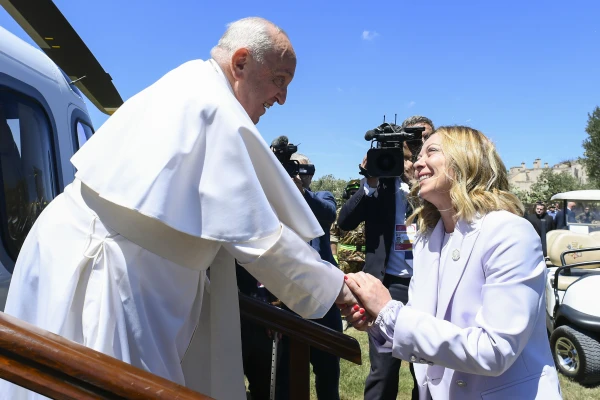Pope Francis traveled to the region of Puglia, in southern Italy, on June 14 to participate in the G7 summit, an annual event that brings together leaders from the 7 most advanced economies in the world: Canada, France, Germany , Italy, Japan, the United Kingdom and the United States.
Receive the main news from ACI Prensa by WhatsApp and Telegram
It is increasingly difficult to see Catholic news on social media. Subscribe to our free channels today:
This year, they will discuss topics such as migration, the situation in the Middle East, Russia’s aggression against Ukraine, economic security or artificial intelligence, a concept on which the Pontiff reflected during his speech.
After 12 noon in Rome, the Holy Father’s helicopter landed in Borgo Egnazia, where the summit takes place from June 13 to 15. This is the first time that a Pontiff participates in this event.
After landing, Pope Francis was received by the President of the Council of Ministers of Italy, Giorgia Meloni.

In the brief welcome ceremony it was possible to appreciate the good relationship that exists between the two. After exchanging a greeting and several moments of laughter, the Pontiff and Meloni traveled by “golf cart” to the residence where the Holy Father held different bilateral meetings with the world leaders present.
In the morning he met with Volodymyr Zelensky, president of the “martyred Ukraine”, with Kristalina Georgieva, General Director of the International Monetary Fund, with the president of France, Emmanuel Macron and with Justin Trudeau, Prime Minister of Canada.
Subsequently, Giorgia Meloni officially welcomed the Holy Father in the courtyard of Borgo Egnazia and, at 2:51 p.m. (about an hour later than scheduled), in the Sala Arena, Pope Francis participated in the Joint Session of the G7 and gave his speech, in which he reflected on Artificial Intelligence.
The Holy Father was the last to arrive at the room and before going to his seat, located to the right of Meloni, he greeted each of the heads of state, among whom was the president of Argentina, Javier Milei, and Joe Biden, president of the United States.
“No machine should ever choose to end the life of a human being”
The Holy Father took advantage of this occasion to reflect on the benefits and also threats posed by artificial intelligence, which is “fascinating and tremendous” at the same time.
Addressing world leaders, Pope Francis warned that this technology “could bring with it greater inequality between advanced nations and developing nations, between dominant social classes and oppressed social classes, thus endangering the possibility of a ‘culture of encounter’. ‘ and favoring a ‘throwaway culture’”.
The Holy Father also highlighted that the use of our tools “is not always directed univocally to the good,” which is why he stressed that “only if their vocation at the service of humanity is guaranteed, will technological instruments reveal not only the greatness and unique dignity of the human being, but also the mandate that the latter has received to “cultivate and care for” the planet and all its inhabitants.”
He also expressed that “it is always up to the human being to make the decision, even with the dramatic and urgent tones with which it sometimes occurs in our lives.”
“We would condemn humanity to a hopeless future if we take away people’s ability to decide for themselves and their lives, condemning them to depend on the choices of machines,” he warned.
Along these lines, he highlighted the urgency of “guaranteeing and protecting a significant space of human control over the election process used by artificial intelligence programs. Human dignity itself is at stake.”
He reiterated that “a drama like that of armed conflicts, it is urgent to rethink the development and use of devices such as the so-called ‘lethal autonomous weapons’ to prohibit their use, starting now with an effective and concrete commitment to introduce human control increasingly larger and significant,” he noted.
Therefore, he emphasized that “no machine should ever choose to end the life of a human being”.
“We must not forget that no innovation is neutral. “Technology is born with a purpose and, in its impact on human society, it always represents a form of order in social relations and a provision of power, which enables someone to carry out certain actions while preventing others from doing so,” he noted.
Furthermore, he stated that Artificial Intelligence must always be ordered for the good “of every human being” and contain “an ethical inspiration.”
Second round of bilateral meetings
After the Joint Session, the Holy Father continued with the round of bilateral meetings. The Pontiff met with the President of Kenya, William Samoei Ruto, with the Prime Minister of India, Narendra Modi, and with the President of the United States, Joe Biden.
Subsequently, he met privately with the President of Brazil, Luiz Inácio “Lula” da Silva, with the President of the Republic of Turkey, Recep Tayyp Erdoğan, and with the President of the Republic of Algeria, Abdelmadjid Tebboune.
At the end of the meetings, the Holy Father departed by helicopter from the Borgo Egnazia sports field to return to the Vatican.

